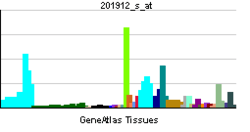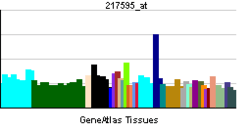GSPT1
Eukaryotic peptide chain release factor GTP-binding subunit ERF3A is an enzyme that in humans is encoded by the GSPT1 gene.[3][4][5]
Interactions
GSPT1 has been shown to interact with BIRC2.[6]
References
- ↑ "Human PubMed Reference:".
- ↑ "Mouse PubMed Reference:".
- ↑ Hoshino S, Miyazawa H, Enomoto T, Hanaoka F, Kikuchi Y, Kikuchi A, Ui M (Dec 1989). "A human homologue of the yeast GST1 gene codes for a GTP-binding protein and is expressed in a proliferation-dependent manner in mammalian cells". The EMBO Journal. 8 (12): 3807–14. PMC 402068
 . PMID 2511002.
. PMID 2511002. - ↑ Lee JA, Park JE, Lee DH, Park SG, Myung PK, Park BC, Cho S (Feb 2008). "G1 to S phase transition protein 1 induces apoptosis signal-regulating kinase 1 activation by dissociating 14-3-3 from ASK1". Oncogene. 27 (9): 1297–305. doi:10.1038/sj.onc.1210740. PMID 17700517.
- ↑ "Entrez Gene: GSPT1 G1 to S phase transition 1".
- ↑ Hegde R, Srinivasula SM, Datta P, Madesh M, Wassell R, Zhang Z, Cheong N, Nejmeh J, Fernandes-Alnemri T, Hoshino S, Alnemri ES (Oct 2003). "The polypeptide chain-releasing factor GSPT1/eRF3 is proteolytically processed into an IAP-binding protein". The Journal of Biological Chemistry. 278 (40): 38699–706. doi:10.1074/jbc.M303179200. PMID 12865429.
Further reading
- Ozawa K, Murakami Y, Eki T, Yokoyama K, Soeda E, Hoshino S, Ui M, Hanaoka F (Mar 1992). "Mapping of the human GSPT1 gene, a human homolog of the yeast GST1 gene, to chromosomal band 16p13.1". Somatic Cell and Molecular Genetics. 18 (2): 189–94. doi:10.1007/BF01233164. PMID 1574740.
- Kikuchi Y, Shimatake H, Kikuchi A (Apr 1988). "A yeast gene required for the G1-to-S transition encodes a protein containing an A-kinase target site and GTPase domain". The EMBO Journal. 7 (4): 1175–82. PMC 454453
 . PMID 2841115.
. PMID 2841115.
- Czaplinski K, Ruiz-Echevarria MJ, Paushkin SV, Han X, Weng Y, Perlick HA, Dietz HC, Ter-Avanesyan MD, Peltz SW (Jun 1998). "The surveillance complex interacts with the translation release factors to enhance termination and degrade aberrant mRNAs". Genes & Development. 12 (11): 1665–77. doi:10.1101/gad.12.11.1665. PMC 316864
 . PMID 9620853.
. PMID 9620853.
- Hoshino S, Imai M, Mizutani M, Kikuchi Y, Hanaoka F, Ui M, Katada T (Aug 1998). "Molecular cloning of a novel member of the eukaryotic polypeptide chain-releasing factors (eRF). Its identification as eRF3 interacting with eRF1". The Journal of Biological Chemistry. 273 (35): 22254–9. doi:10.1074/jbc.273.35.22254. PMID 9712840.
- Merkulova TI, Frolova LY, Lazar M, Camonis J, Kisselev LL (Jan 1999). "C-terminal domains of human translation termination factors eRF1 and eRF3 mediate their in vivo interaction". FEBS Letters. 443 (1): 41–7. doi:10.1016/S0014-5793(98)01669-X. PMID 9928949.
- Hoshino S, Imai M, Kobayashi T, Uchida N, Katada T (Jun 1999). "The eukaryotic polypeptide chain releasing factor (eRF3/GSPT) carrying the translation termination signal to the 3'-Poly(A) tail of mRNA. Direct association of erf3/GSPT with polyadenylate-binding protein". The Journal of Biological Chemistry. 274 (24): 16677–80. doi:10.1074/jbc.274.24.16677. PMID 10358005.
- Loftus BJ, Kim UJ, Sneddon VP, Kalush F, Brandon R, Fuhrmann J, Mason T, Crosby ML, Barnstead M, Cronin L, Deslattes Mays A, Cao Y, Xu RX, Kang HL, Mitchell S, Eichler EE, Harris PC, Venter JC, Adams MD (Sep 1999). "Genome duplications and other features in 12 Mb of DNA sequence from human chromosome 16p and 16q". Genomics. 60 (3): 295–308. doi:10.1006/geno.1999.5927. PMID 10493829.
- Cosson B, Berkova N, Couturier A, Chabelskaya S, Philippe M, Zhouravleva G (Sep 2002). "Poly(A)-binding protein and eRF3 are associated in vivo in human and Xenopus cells". Biology of the Cell / Under the Auspices of the European Cell Biology Organization. 94 (4-5): 205–16. doi:10.1016/S0248-4900(02)01194-2. PMID 12489690.
- Hegde R, Srinivasula SM, Datta P, Madesh M, Wassell R, Zhang Z, Cheong N, Nejmeh J, Fernandes-Alnemri T, Hoshino S, Alnemri ES (Oct 2003). "The polypeptide chain-releasing factor GSPT1/eRF3 is proteolytically processed into an IAP-binding protein". The Journal of Biological Chemistry. 278 (40): 38699–706. doi:10.1074/jbc.M303179200. PMID 12865429.
- Janzen DM, Geballe AP (2004). "The effect of eukaryotic release factor depletion on translation termination in human cell lines". Nucleic Acids Research. 32 (15): 4491–502. doi:10.1093/nar/gkh791. PMC 516063
 . PMID 15326224.
. PMID 15326224.
- Le Roy F, Salehzada T, Bisbal C, Dougherty JP, Peltz SW (Jun 2005). "A newly discovered function for RNase L in regulating translation termination". Nature Structural & Molecular Biology. 12 (6): 505–12. doi:10.1038/nsmb944. PMID 15908960.
- Brito M, Malta-Vacas J, Carmona B, Aires C, Costa P, Martins AP, Ramos S, Conde AR, Monteiro C (Dec 2005). "Polyglycine expansions in eRF3/GSPT1 are associated with gastric cancer susceptibility". Carcinogenesis. 26 (12): 2046–9. doi:10.1093/carcin/bgi168. PMID 15987717.
- Chauvin C, Salhi S, Le Goff C, Viranaicken W, Diop D, Jean-Jean O (Jul 2005). "Involvement of human release factors eRF3a and eRF3b in translation termination and regulation of the termination complex formation". Molecular and Cellular Biology. 25 (14): 5801–11. doi:10.1128/MCB.25.14.5801-5811.2005. PMC 1168810
 . PMID 15987998.
. PMID 15987998.
- Kashima I, Yamashita A, Izumi N, Kataoka N, Morishita R, Hoshino S, Ohno M, Dreyfuss G, Ohno S (Feb 2006). "Binding of a novel SMG-1-Upf1-eRF1-eRF3 complex (SURF) to the exon junction complex triggers Upf1 phosphorylation and nonsense-mediated mRNA decay". Genes & Development. 20 (3): 355–67. doi:10.1101/gad.1389006. PMC 1361706
 . PMID 16452507.
. PMID 16452507.
- Tompkins V, Hagen J, Zediak VP, Quelle DE (Mar 2006). "Identification of novel ARF binding proteins by two-hybrid screening". Cell Cycle. 5 (6): 641–6. doi:10.4161/cc.5.6.2560. PMID 16582619.
- Lim J, Hao T, Shaw C, Patel AJ, Szabó G, Rual JF, Fisk CJ, Li N, Smolyar A, Hill DE, Barabási AL, Vidal M, Zoghbi HY (May 2006). "A protein-protein interaction network for human inherited ataxias and disorders of Purkinje cell degeneration". Cell. 125 (4): 801–14. doi:10.1016/j.cell.2006.03.032. PMID 16713569.
- Chauvin C, Salhi S, Jean-Jean O (Aug 2007). "Human eukaryotic release factor 3a depletion causes cell cycle arrest at G1 phase through inhibition of the mTOR pathway". Molecular and Cellular Biology. 27 (16): 5619–29. doi:10.1128/MCB.00035-07. PMC 1952125
 . PMID 17562865.
. PMID 17562865.



 . PMID 2511002.
. PMID 2511002. . PMID 2841115.
. PMID 2841115. . PMID 9620853.
. PMID 9620853. . PMID 15326224.
. PMID 15326224. . PMID 15987998.
. PMID 15987998. . PMID 16452507.
. PMID 16452507. . PMID 17562865.
. PMID 17562865.